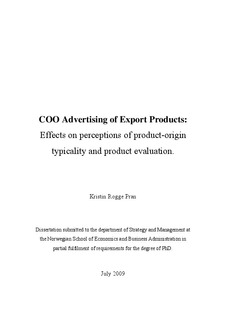COO advertising of export products : effects on perceptions of product-origin typicality and product evaluation
Doctoral thesis
Permanent lenke
http://hdl.handle.net/11250/164348Utgivelsesdato
2009Metadata
Vis full innførselSamlinger
Sammendrag
COO labels increasingly appear on food products as a response to the growing consumer demand for safety, traceability and authenticity. However, little research has been done to examine the effect of these labels. COO research has focused on the effects of country image on product evaluation. In this study t is argued that product-origin typicality perceptions are a prerequisite for COO effects: if a product is not considered as typical of its origin, the origin attribute will not be relevant, and the product evaluation will be done on the basis of other attributes. Thus, the questions asked are: how can COO advertising affect product-origin typicality, how are product-origin typicality and product evaluation related, and how should new (atypical) products be introduced in an export market?
The first study found that COO advertisements do have an impact on typicality perception, but that the use of COO labels and the type of product advertised moderate the effect of the observed variables differently. The findings also showed that the effect of product typicality perceptions on product evaluations is mediated by origin attitude. In the second study, the focus was on whether a new export product should be linked to an established product in order to facilitate the transfer of origin associations (spill-over effects). However, the findings indicated that direct exposure to a new product could be an advantage because it increased the processing of origin information.
This thesis contributes to the COO literature by extending the knowledge of how product-origin perceptions of typicality can be affected and how they are related to product evaluation. The findings also extend the knowledge of how COO labels affect attitude formation.
